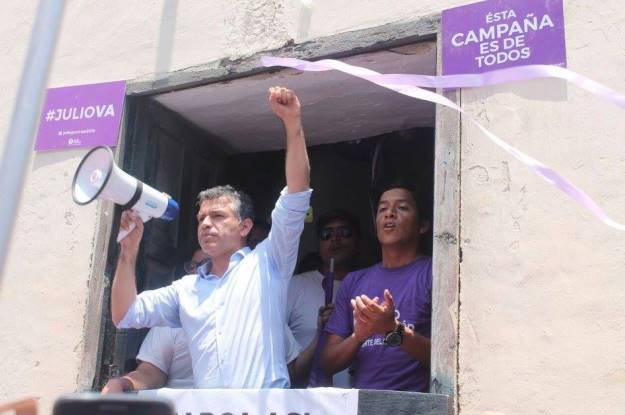Julio Guzmán is running out of options. Barred from running for president in Peru’s April 10 elections on a technicality, Guzmán late on March 13 lost what appears to be a final legal appeal for his candidacy to be reinstated.
A center-right technocrat who worked at the Inter-American Development Bank in Washington for 10 years, Guzmán had emerged as the leading challenger to front-runner Keiko Fujimori. His support in polls grew from under 1 percent in December to close to 20 percent in early March.
With the election less than a month away, the Organization of American States (OAS) expressed “concern” over the disqualification of candidates so close to the vote. The Washington Office on Latin America called the original decision to exclude Guzman “an affront to democracy and the rule of law.”
In an interview with AQ prior to Monday’s decision, Guzmán was optimistic about his chances for reinstatement. He said he believed “new information” would push the electoral court to reconsider its decision.
How he will decide to move forward now remains unclear. But in the same interview, Guzmán said he was “not considering a scenario in which we don’t participate [in the election] because the law and the truth is on our side.”
“Psychologically, emotionally, I’m sure that we’re going to continue on. I will also say, though, that we’re building a strong institutionalized party that will help institutionalize democracy in Peru,” Guzmán told AQ.
Below is a transcript of that interview, conducted in person on March 10. It has been translated and edited for length and clarity.
AQ: What’s the new information you believe will make the court reconsider your case?
JG: First, in the last few days, we’ve learned that three other political parties made the same administrative error as us, and have nevertheless been allowed to continue to participate. And the second bit of information is a JNE [National Jury of Elections] ruling that found that the executive committee of one of our rival political parties was allowed to make electoral decisions. The very next day, they excluded our party with the exact opposite finding: They decided our executive committee did not have the authority to make an electoral decision. It’s a clear contradiction, from one day to the next. From one party to the next.
So we need the authorities to confront this contradiction. The cause of our exclusion can’t be found anywhere in Peruvian law. That’s why we’re reacting so strongly, that’s why we reject this decision, that’s why we’re outraged. We’re being excluded for something that can’t be found anywhere in the law.
AQ: Both the OAS and the U.S. House Committee on Foreign Affairs have released statements saying they’re “concerned” about the legitimacy of the coming election. Has either been in touch with you or your campaign?
JG: No. They’re paying attention because the foreign press began to release articles on this case in the days before the JNE’s decision. This has passed our national borders and Latin America’s borders – it would be the first time in the history of Peru, and in the history of modern democracies, for a candidate to be excluded from a presidential race on technical grounds.
AQ: It’s hard for outsiders to understand, I think. If there was a technical error with your candidacy, why wouldn’t they have figured that out when you filed your paperwork in December?
JG: I’ll tell you why. Because in December we were polling at 1 percent. These “scandals” start to pop up as soon as we passed the psychological barrier of 5 percent [Note: a party must get at least 5 percent of the vote in the first round of voting in order to get seated in Congress.] That’s why they’re doing this now. We have documentary evidence that three parties – three parties who are currently participating, no problem – made the same technical error as we did. The same exact thing. And yet they’re allowed to run. And us? It’s scandalous.
AQ: When did you begin to consider running for president? What drives you towards it?
JG: I first thought about running for president when I left my position as secretary-general of the council of ministers in the current government. Before that, I studied public policy at Georgetown [University], I did a doctorate at [the University of] Maryland, I spent 10 years in Washington working at the Inter-American Development Bank; then I came back to Peru and worked as a vice-minister and then got the job on the council of ministers. And after all of that experience, I came home with one conclusion: The only way to change things in Peru is by being president of the republic. We’ve got a system that concentrates many constitutional powers in the presidency. If the president isn’t ambitious, if he isn’t a leader, if he doesn’t make decisions, the country won’t move forward. That’s why I decided to run.
—
Lucas Iberico Lozada is a freelance reporter based in Lima, Peru.







